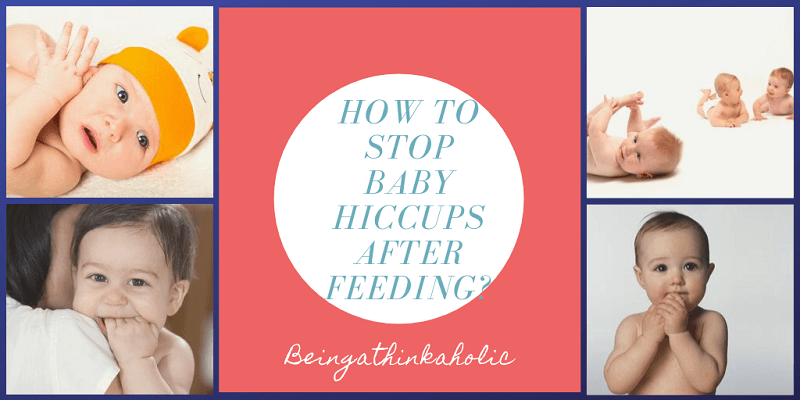Hiccups are very normal in babies, especially in the newborn ones. In general, hiccups are one of the normal behaviors or reflex action of the body and usually the baby hiccups after feeding. However, it can be a startling experience for new parents seeing their baby having hiccups frequently and can be a reason for their anxiety. Mostly, pediatricians suggest that a baby hiccups because of the contraction of the diaphragm and the rapid closure of the vocal cords in your little ones.
I am sure in most Indian families, there is a myth regarding the same. I remember, when Little Miss A used to get hiccups her grandparents would say this is a sign of growing up. Your newborn baby can have hiccups numerous times within a day.
As long as your little one is not getting distressed or is not feeling uncomfortable due to these hiccups; there is nothing to worry about. However, even if these hiccups are normal reflexes you will always want your baby to get some amount of relief during these hiccups. We will discuss in detail the major reasons for hiccups and some of the actions which can reduce the discomfort of your baby due to hiccups.
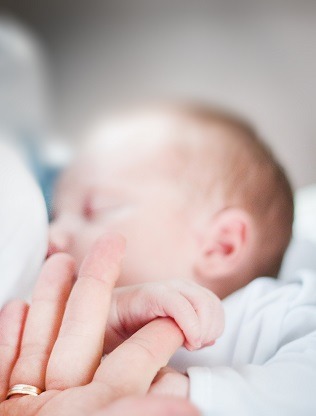
Table of Contents
Why A Baby Hiccups After Feeding?
As I said earlier, a very common reason for the occurrence of hiccups in babies after feeding is the repetitive contraction of the diaphragm of your baby. This contraction or irritation in your baby’s diaphragm occurs many times either due to crying for a longer period of time or due to fast eating and drinking. When any of these situations occur, there are spasms in the diaphragm and the vocal cords close down leading to hiccups.
Many times hiccups can also occur due to some air being trapped in the stomach of your baby while eating or drinking. This can lead to the expansion of your baby’s stomach which pushes against the diaphragm and leads to the spasms.
Sometimes, prolonged giggling in your little ones can also be a reason for triggering of the hiccups. As your baby is small, the organs of your baby are quite underdeveloped and need a lot of time for development. With the growth of your baby, the organs will also develop properly and the frequency of occurrence of hiccups will lower down gradually.
Some of the major causes due to which the diaphragm of a newborn baby contracts or gets irritated can be listed below.
After feeding effect
As said earlier, during the process of feeding there might be lots of air sucked or swallowed by your baby and because of this excess air a baby hiccups after feeding.
Temperature changes
Sometimes, newborn babies respond to changes in the atmospheric temperature by these hiccups. Mostly, when the temperature is quite low babies will start to hiccup.
Overfeeding your baby
Many times while you are feeding your baby either with breast milk or with the formula milk, there are possibilities of your baby being overfed. This overfeeding results in bloating in the baby’s stomach causing expansion of the abdominal cavity leading to spasms in the diaphragm.
Allergies
There can be many cases in which your baby might be allergic to certain compounds present in the formula milk or the breastfeeding mom has eaten some food items which lead to inflammation of the baby’s food pipe causing hiccups.
Gastro esophageal Reflux Disease (GERD)
This is quite common in toddlers in which acid from your baby’s stomach is released into the esophagus causing hiccups.

Baby Hiccups In the Womb
Many expecting mothers state and share the experience of baby hiccups in the womb as well. This is quite common during 6 months of pregnancy when the lungs of your baby start developing and you can feel minor spasms in the abdomen. These regular spasms are the baby hiccups in the womb or can be termed as fetal hiccups.
These fetal hiccups are movements in your baby’s diaphragm when he is learning to breathe as the lungs are developing. When the baby in your womb is inhaling and exhaling amniotic fluid, there are contractions in the diaphragm which even indicates that the diaphragm development is occurring properly.
Fetal hiccups also indicate proper neurological development in the fetus as these hiccups signal that the nerve which controls the diaphragm is active.
Fetal hiccups can occur several times in a day and they become very frequent around the onset of the third semester. However, the baby hiccups in the womb start reducing as your time of delivery starts approaching near. It is mostly said that if a baby had a large number of baby hiccups in the womb then the baby will likely have numerous hiccups after birth as well. Again, this could be a myth.
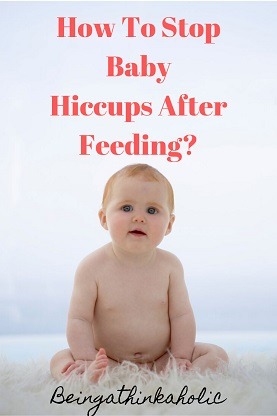
How To Stop Baby Hiccups After Feeding?
There are some common methods that are advisable for getting relief when the baby hiccups after feeding. These general methods will help us to know how to stop baby hiccups after feeding.
Taking a break during feeding for burping
While you are breastfeeding your newborn baby, it is advisable to take a break from the regular feeding for a couple of minutes and make your little one burp. You can hold your baby in an upright position and make him burp by gently rubbing or patting his back.
This will help your baby to get rid of the excess air that might have been swallowed while feeding and this helps to stop baby hiccups after feeding. Burping a baby is essential. To know why and how to do it, read my post, Why is It Important to Burp Your Baby After Feeding.
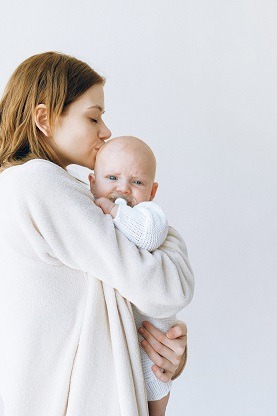
Use of a Pacifier
Sometimes if your baby has started to get hiccups, you can let him suck a pacifier. This will help the diaphragm to relax and will stop the hiccups in your baby.
Avoid overfeeding
Overfeeding has been found to be one of the major reasons causing baby hiccups after feeding. You should try reducing the quantities you feed to your baby at one point in time. You can feed your baby for some time and then take a break, make your baby burp and then resume the feeding again.
Gripe water
Gripe water is a combination of various herbs with water and is very useful for babies having stomach discomfort. Gripe water consists of herbs such as ginger, fennel seeds, cinnamon, licorice, lemon balm, etc. together which will help in getting rid of colic, hiccups and other gastro-intestinal discomforts in your baby. Many pediatricians do not agree to the use of gripe water and I also never used it. But I know many mothers who do and are happy with it too.
Distraction
This is an old school method for getting rid of baby hiccups. This method of stopping hiccups is even famous for adults. You can try and distract your baby by giving some toys to play or putting your baby in a rocking chair for some time, etc.
Give Sugar
This method to stop baby hiccups after feeding is applicable for those kids who are above the age of 1 year and have already started having solid food items. The sweetness of sugar will help in nerve distraction and will stop the baby hiccups after feeding.
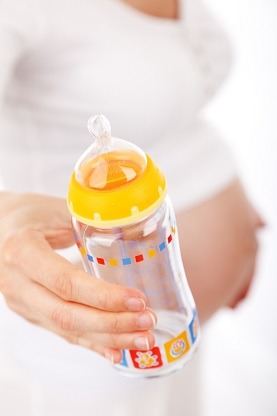
Check the Nipple of Your Baby’s Bottle
You should purchase the nipple of your baby’s feeding bottle very carefully. The nipple should be a perfect fit depending on the age of your baby. The size of the nipple should not have to be too big as it makes the baby swallow a large amount of air which can cause baby hiccups after feeding.
Rubbing the Baby’s Back
You can try and rub your baby’s back gently or you can rock your baby in a back and forth manner. This will help in reducing those spasms that cause the baby hiccups after feeding.
Let the Hiccups Stop by Themselves
Mostly, it is advisable to let the hiccups stop by themselves as most hiccups tend to stop by themselves after some time. In case, your baby is not feeling too much distressed or irritated with the hiccups you can let them stop on their own.
(As a new mom you are bound to be clueless, We have some useful tips for you. If you are a new mom you must read our post, Things You Need to Know as A New Mother)
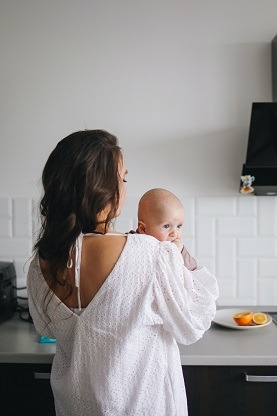
How to Prevent Hiccups in Babies?
Even though it is not possible completely to prevent the occurrence of hiccups in babies but some preventive measures can be taken.
- You should always ensure that your baby is calm while you are feeding your baby. This means you should feed your baby according to a routine that has been set up and not when the baby is very hungry and is no calm at all.
- It is advisable to hold your baby in an upright position for at least 20 minutes to 30 minutes after feeding. This will help in preventing hiccups up to a greater extent.
- You should avoid certain high energy activities like bouncing, high-energy play, etc. as these activities when carried out immediately after feeding can result in hiccups.
Activities to be Avoided to Stop Baby Hiccups
There are certain activities that should never be tried with babies to stop baby hiccups.
You should never try to startle or frighten your baby just to stop the hiccups. This never works and can be very dangerous for your baby as well. Even trying to hold your baby’s breath for getting rid of hiccups is the worst idea for babies and can be very dreadful. You should also avoid putting a wet cloth on your baby’s forehead and pulling or pressing his tongue.
These activities do not help in stopping baby hiccups after feeding; rather they can be dangerous for your baby and also can hurt your baby.
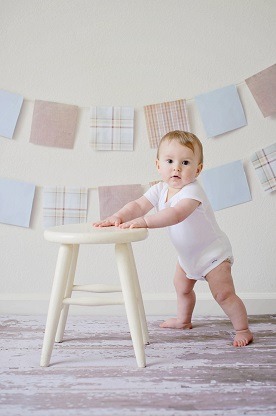
When You Should Worry About Hiccups?
Even though baby hiccups after feeding are quite normal, but sometimes there might be a reason to visit the pediatrician. When your baby is getting frequent hiccups and is feeling very uncomfortable due to these hiccups, you should visit the pediatrician and take up his opinion on this.
If the hiccups in your baby are not letting him eat or sleep peacefully and the baby is cranky in turn then this is a matter of concern and should be dealt with by the pediatrician. Usually, the hiccups in babies reduce prominently once they are above 1 year of age; but if your baby is still having excessive hiccups even after his first birthday then it is advisable for you to consult a pediatrician soon.
(If you are confused about choosing a pediatrician for your little one, you must read our post, How to Choose a Pediatrician for Your Baby for some helpful tips)
Conclusion
Hence, the occurrence of baby hiccups after feeding is very common among babies and new parents should not be much worried about this. It is advisable to try and prevent the occurrence of hiccups by following the suggested steps, but however, if hiccups have been triggered then you can follow the general instructions to get rid of them. You should let the hiccups go away themselves and as long as your baby is not feeling uncomfortable due to the hiccups; they are not harmful or dangerous for your baby.
You may also like to read:

